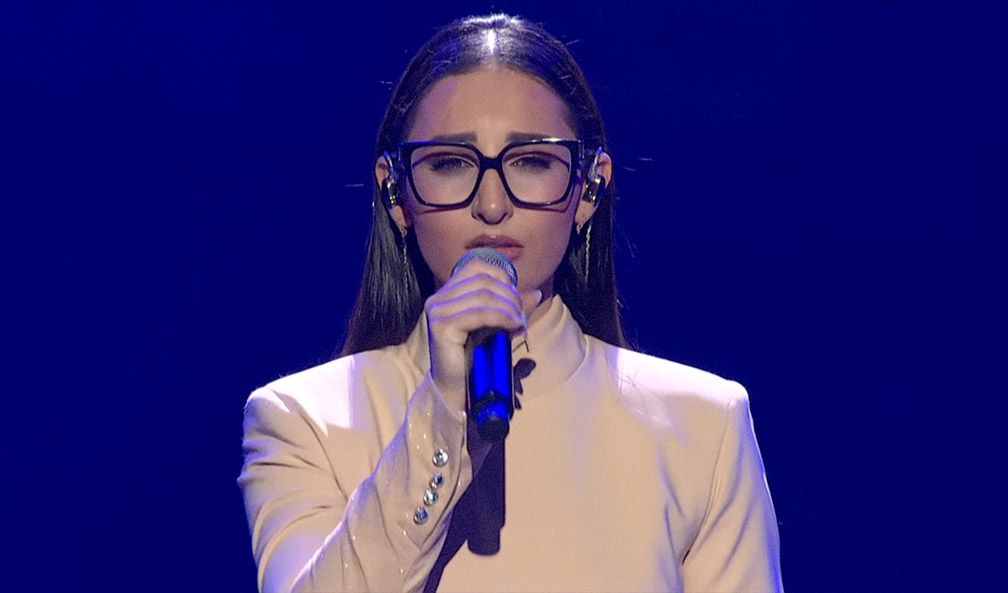“I’m not the right person to give advice”: Greece’s Eurovision 2024 representative, Marina Satti, speaks about Greece’s current contestant and clarifies her intentions regarding Eurovision. What’s really behind the dramatic decision?
Marina Satti, who represented Greece at Eurovision 2024 with the song “Zari“ (translates as: “Dice”), now reveals personal details about her journey in the contest. The feelings she shares indicate a clear desire to close one chapter and open another. Is this an admission of failure – or a natural response to pressure and criticism? And what did she think of Greece’s current representative?
“I’m Not the Right Person to Give Advice”
 During an interview on the Greek show “Ακόμα δεν είδες τίποτα” (tranlates as: “You Haven’t Seen Anything Yet”), Marina Satti was asked about her feelings regarding the participation of Klavdia, Greece’s representative at Eurovision 2025, which will take place on May 15 in Basel, Switzerland. Satti praised the song and the performer but emphasized that she does not feel it is her role to advise someone currently in the spotlight. She said:
During an interview on the Greek show “Ακόμα δεν είδες τίποτα” (tranlates as: “You Haven’t Seen Anything Yet”), Marina Satti was asked about her feelings regarding the participation of Klavdia, Greece’s representative at Eurovision 2025, which will take place on May 15 in Basel, Switzerland. Satti praised the song and the performer but emphasized that she does not feel it is her role to advise someone currently in the spotlight. She said:
“A very beautiful song and a very good singer. I believe she will do an excellent job. I don’t think predictions and betting odds matter. I am not the right person to give advice to Klavdia. What matters is that she be herself and enjoy the experience.”
This approach, expressing great respect and appreciation for her successor on the Eurovision stage, also reflects Satti’s personal view on the importance of authenticity and enjoyment in the contest, rather than focusing on numbers and predictions.
Her Personal Eurovision Experience: Satti Reflects
 In the same interview, Marina Satti was also asked about her personal experience participating in Eurovision 2024 with the song that finished outside the top ten. Her response was direct and revealed her thoughts on how she views the contest today, in hindsight:
In the same interview, Marina Satti was also asked about her personal experience participating in Eurovision 2024 with the song that finished outside the top ten. Her response was direct and revealed her thoughts on how she views the contest today, in hindsight:
“In retrospect, everyone can say whatever wisdom they like. What matters is that, with the knowledge we had at the time, we did the best we could. There is no doubt we did our best. As of now, I have no thoughts of returning to Eurovision.”
This clear statement quashes any hopes fans might have of seeing Satti represent Greece again in the near future – and also signals her complete acceptance of how she managed her participation, despite all the criticism and pressures she faced, following her controversial behavior toward Israel’s representative, Eden Golan, which even prompted an official response from the Greek government.
A Conscious Decision to Move On
Marina Satti’s responses and her decision not to return to Eurovision seem to stem from a desire to continue focusing on her personal and authentic artistry, without being swept up by the expectations and pressures that come with the competition.
The singer’s statement marks not only a farewell to Eurovision but also an admission of the fragility of the path she chose. While other artists view Eurovision as a springboard for their careers, it seems Satti is choosing to step away from the stage – perhaps out of frustration, perhaps out of cold calculation. Her direct words leave a strong impression but also convey a sense of relinquishing a battle that might have taken her further. Instead of fighting for her place on the international stage, Satti chooses to close the door – leaving the question of whether she could have achieved more open and thought-provoking.
Greece at Eurovision 2025
“Asteromáta” (in English: “Starry Eyes”) is the song that will be performed by Klavdia, representing Greece in the second semi-final of Eurovision 2025, scheduled for May 15th in Basel, Switzerland. The song was written by the singer herself, together with the creative team Arcade, who previously wrote Greece’s Eurovision entries for 2020 and 2021, “Superg!rl” and “Last Dance”, for Stefania Liberakakis. The song is performed in Greek.
“Asteromáta” deals with deep longing and pain over separation and loss, using romantic and poetic language. The singer addresses a loved one, calling them “my little star” and “starry eyes,” expressing her wish to be close, to feel their presence, and to find peace. Imagery such as “my dear mother, don’t cry” and “my old body, the flames won’t defeat it” evoke resilience in the face of hardship, with a deep connection to nature and the past, as referenced by “the sand of my roots” and yearning for a return home or to a safe place. Metaphors like “forgotten wings” and “sacred abysses” convey a search for inner connection and lost wholeness. Together, these create a picture of loss, but also hope for reconnection and comfort. The song’s poetic language evokes feelings of love, longing, and the desire for peace and solace.
Currently, Greece is ranked 19th in the betting odds for Eurovision 2025.
Klavdia – Who Are You?
Klavdia Papadopoulou, a Greek singer who rose to fame after participating in the Greek version of The Voice in 2018, is one of tonight’s most compelling contenders. Her mentor during the competition was none other than Eurovision winner Helena Paparizou, who guided her all the way to the finals.
For “Ethnikos Telikos 2025”, Klavdia collaborated with Arcade, a team of renowned music creators and producers who also wrote her entry “Asteromata“. The song blends modern elements with traditional Greek music, creating an emotional and captivating piece. With its melancholic tone, “Asteromata” draws inspiration from Klavdia’s family’s survival story during the Pontic Greek genocide – a deeply personal narrative that adds significant weight to her performance.
Source: vradini
Eurovision 2025: This will mark Greece’s 45th participation in Eurovision. Greece joined the competition in 1974 and achieved its best result in Eurovision 2005 when singer Helena Paparizou won first place with the song “My Number One”.



